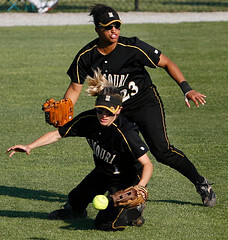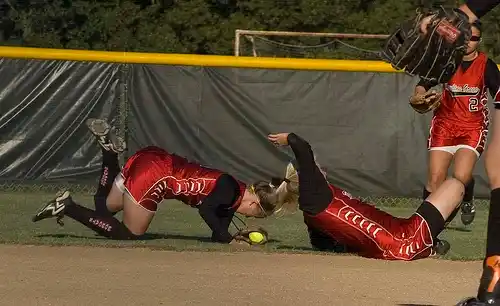Suppose we have a player who drops a fly ball, boots a ground ball, drops a throw, or otherwise does something which is not the tradition of softball. Suppose the team just isn’t hitting. Suppose the “error bug,” heebie jeebies, jitters, or just plain chaos strikes suddenly during a great game. Or perhaps they occur at the onset and remain for the duration. Suppose our pitcher can’t find the strike zone and when she does, the ball meets the opposing bats with tremendous force.

It is Smitty’s law that during these spells bad things will happen to the outcome of the game, unless, of course, the other team has the same villainous deficiencies.
Let’s examine some of these miserable conditions which seem to crop out at the most inopportune times.
Well, the other team may be so overwhelming tremendous that we have no chance and probably should not be on the field in the first place. Is this a given?
Once I had a very powerful teener team way back when. A close friend who had a not-so-powerful team want to play a doubleheader. I tried to discourage him, but he persisted.
We played and won by two lopsided scores. He wanted a second chance. “You’re nuts!” said I, but he persisted, and we went at it a second time. This time we won, but only by one run in each game. Wonder of wonders! His team had improved.
Thinking back, I remember that during the two-game catastrophe which befell his team, my friend was constantly coaching his team. When we hit our “gappers,” he used the opportunity to teach his team all about relays. His shortstop had to field rockets and his pitcher had to duck after every pitch, but after each inning he was busy explaining what had to be done to overcome their various problems. The “dirty rat” had used our first doubleheader for practice! He used us to show his team what they had to do to be winners. He used the loss, the errors, the strikeouts, and the talks not as negatives, but as positives to learn by. Then, after the game and before the next doubleheader he showed his team more fundamentals and, wonder of wonders, practiced them.
So, what usually happens after a sound beating! Not the above scenario, but a royal chewing out. After the game the team is called to a huddle and there they sit through yak, after yak, after yak. Don’t we realize that the kids know they played poorly, did poorly, and then after the first few minutes of our crazed “speech” they aren’t listening? They don’t hear us! We are wasting our time!
But why do we spend time yelling at them after a poor performance? Sometimes they need it, for sure. Most of the time they don’t. What they need is instruction, not destruction. To be told how bad you are time and time again…you have no intensity…you don’t have your head in the game… to be asked over and over, “What’s wrong with you?” …to be told that you didn’t come to play…on and on and on and on. Yes, it’s YOUR fault!
Sometimes I wonder whether coaches who do this know what to do to correct the situation other than talk. Talking replaces teaching fundamentals. I guess, for it is another of Smitty’s laws which states very clearly that talking will not win games, but correctly practicing fundamentals will!

There is a reason a player strikes out. Perhaps the opposing pitcher is very, very good. This explains much. But most pitchers can be handled. If a player strikes out, it is incumbent upon the coach to determine the reason. Is it a one-time thing or is the player doing it regularly? If the later, then the coach must find out the reason and correct it.
If a team does not hit on regular basis, there is a reason. Perhaps a hitting coach is needed, or perhaps a new hitting coach is needed. A one or two game slump is not reason for worry. Consistent performance at the plate is.
If a shortstop boots a ball, there is a reason. It might be a bad hop, poor glove work, head coming off the ball, general incompetence, fear, or just plain bad luck. All of these things happen. It’s up to us coaches to find out why.
Why does the pitcher’s control go suddenly “ape”? The pitcher may be tired. She may be injured, stressed out, overworked, or just plain outgunned. She may not have practiced the way she should. Reasons abound. Coaches must work hard to understand what is really happening in a game and try to overcome the problems.
Why does a nine-year girl consistently drop a pop-up? Because no one ever showed her the proper way to catch one, or if they did, then there was no consistent practice of the skill.
Why can’t our team bunt? Because we either have a lousy bunting coach or we don’t practice the art.
Why is it that we have practiced this play or that play on a regular basis, and yet, when we get into the game, we louse it up? I would hazard a guess that the team is either uptight or the fundamentals of the play were practiced incorrectly.
Why is a team uptight, nervous, scared, or otherwise mentally unprepared to play? The word “unprepared” says it all. Quite often, the reason is that the coach is pretty much responsible.
Yeah! When the opponent’s centerfielder makes an outstanding catch of our “gapper”, we can say, “Our hitter hit the ball the right way, because we taught her the right thing, in the right way, and it was practiced correctly.”
We can even give credit to the opponent’s fielder for a great effort, including giving her high fives as she comes off the field. Ever done this, Coach? Have you sulked over your bad luck? Or have you blamed your hitter for failing to hit the ball two more inches into the gap? Sure! We coaches are so adept at teaching the art of hitting that our batters can be trained to hit the ball exactly where the fielder won’t catch it. I guess that’s why we have so many 1.000 batting averages.
So, in the vast majority of these cases, we as coaches should not be concerned with laying blame. Worry should be concentrated less upon fault and more on practicing the fundamentals of the game correctly. That way, when things go awry, we can often chalk it up to some of the above circumstances, and fault becomes moot.